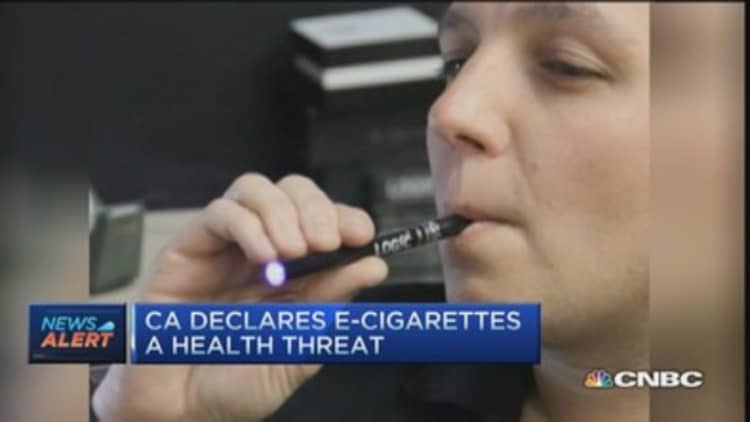Despite hiking up prices, plastering anti-smoking images across packaging and banning it in public places, the war on smoking is nowhere near over.
Smoking rates in the U.K. have more than halved since 1974, according to charity Action on Smoking and Health (ASH).
However, use of e-cigarettes—also known as vaporisers—has taken off, with the number of British e-cigarette smokers rising threefold in the two years to November 2014 to 2.1 million, the charity said.
What may be worse is that e-cigarettes are increasingly faddish with British teenagers.
Although e-cigarettes have been marketed as a healthier option for conventional cigarette smokers, or as a smoking cessation method, a new report has found that one in five U.K. adolescents (19.2%) have tried e-cigarettes, and for 16 percent of them, this was their first taste of smoking.
The report was based on a survey conducted by Liverpool John Moores University of 16,193 high school students in the north west of England, aged from 14 to 17 years. It was published by BioMed Central Public Health, an open-access, peer-reviewed journal, on Tuesday.
Commenting on the popularity of e-cigarettes with British teens, Mark Bellis, one of the report's authors, said: "Such rapid penetration into teenage culture of what is essentially a new drug use option is without precedent."
Teenagers who drank alcohol were "significantly more likely" to have used e-cigarettes, with frequent binge-drinkers more than four times more likely to have done so.

One of the report's authors, Karen Hughes, said that this suggested that "E-cigarettes have rapidly become part of at-risk teenagers' substance using repertoires."
"E-cigarette access was associated with binge drinking and involvement with violence after drinking. The researchers say that these findings suggest that teenagers who access e-cigarettes are those that are most susceptible to other forms of substance use and risk-taking behaviors," a press release accompanying the report said.
Worryingly, it's not only British adolescents who increasingly use vaporized nicotine. E-cigarettes are popular amongst North American teenagers, with 17.1 percent of 12th graders (17-18-year-olds) and 8.7 percent of 8th graders (13-to-14-year-olds) having used the product, according to a survey published by the National Institute on Drug Abuse in December 2014.

Healthy alternative?
Some e-cigarette companies advertise the sticks as a healthy alternative to tobacco-infused cigarettes. E-Lites had an advertising campaign with the tagline "the satisfying smoking alternative," while Blu Cigs advertised with a "Why Quit? Switch to Blu" poster, stating that "Blu is the smart choice for smokers wanting a change. Take back your freedom."
However, the BioMed report said that of the teenagers who had tried e-cigarettes, more had never previously smoked than were ex-smokers of conventional cigarettes.
The jury is out on whether e-cigarettes are genuinely a safer alternative to conventional smoking.
The Public Library of Science, a non-profit U.S. organization, has published an article based on researchers from various universities that states that the vapors produced from e-cigarettes could cause damage to the lungs, and could alter people's immune response to infections, based on tests on mice.
Researchers from University of Rochester Medical Center backed up this claim, suggesting that the vapors produced could "induce toxicity, oxidative stress and inflammatory response" within the lungs.
Another report, published in the New England Journal of Medicine, suggested that e-cigarettes contained "hidden formaldehyde," which is classed as a human carcinogen that has been linked to cancer.
Overall, all these studies suggested that the electronic, non-tobacco form of cigarettes should not be used as a substitute to conventional smoking.


